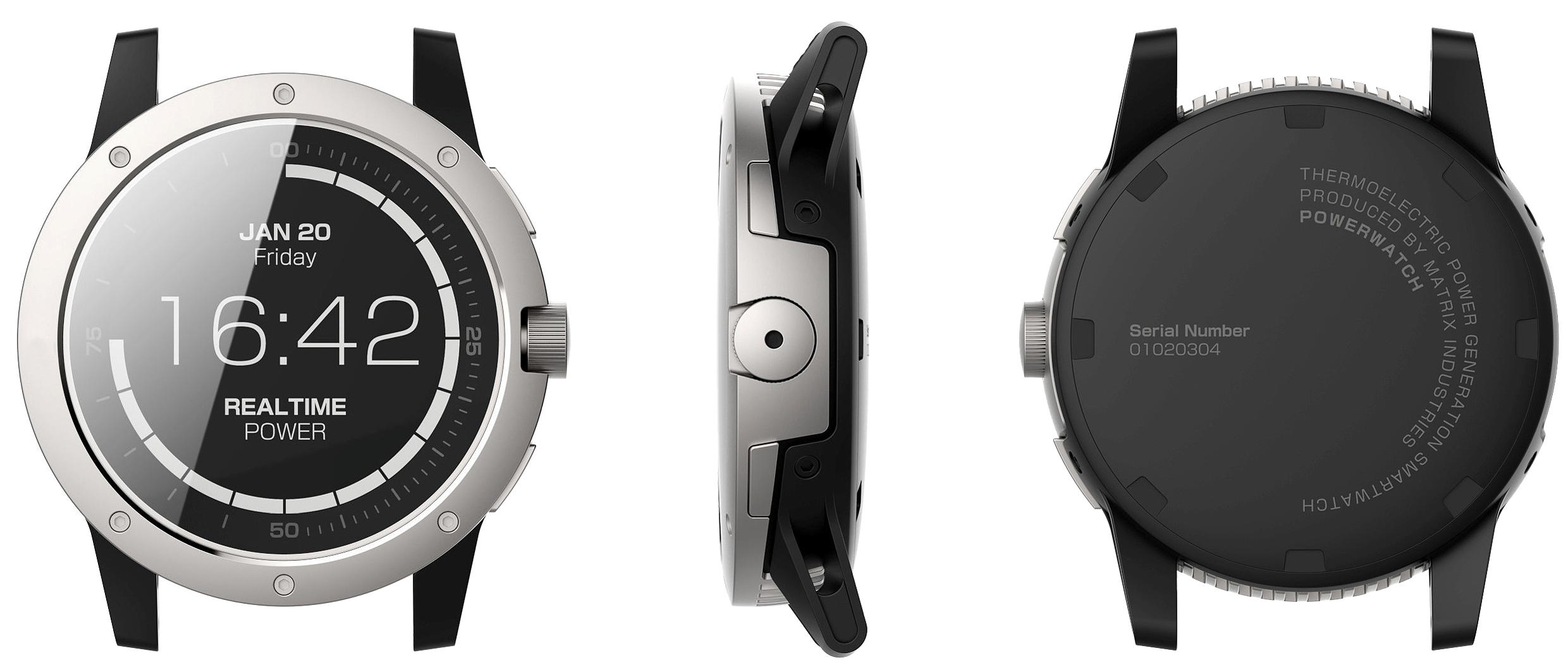This fitness tracking smartwatch never needs to be charged because it's powered by you
Matrix Powerwatch counts steps and calories and has no need of fripperies such as chargers or batteries


Fed up of charging your fitness-tracking watch, or replacing the little disc-shaped battery inside it? Matrix PowerWatch takes its energy from your body heat and its maker claims you never need to charge it.
And no, you'll be pleased to know that doesn't mean that you can never ever take it off, if you want to keep it alive.

Matrix PowerWatch, from £200
Although Matrix is marketing its Indiegogo crowd-funded timepiece as a 'smart watch', realistically it's a fitness and sleep tracker.
It harvests your body heat for fuel and tells you your steps taken, calories burned. Matrix is claiming a high degree of accuracy, presumably because the calorie figure can be based on your body temperature rather than just being an estimate based on steps alone.
As it also seems to be rather an attractive piece, the PowerWatch immediately fulfils the key criteria for a wearable: you want to wear it, and you don't have to keep taking it off to charge it up.



Although Matrix's watch doesn't do an awful lot – there are no WatchOS-style apps, and not even basic notifications – the fact it's able to work as a step counter and watch without the need of a battery is highly impressive.
That's achieved through what Matrix is claiming as new developments in thermoelectric generators, boost conversion circuitry thermal harvesting. An on-screen power meter tells you how much electricity your body heat is producing.
Get all the latest news, reviews, deals and buying guides on gorgeous tech, home and active products from the T3 experts
“Of all the places on the human body to harvest heat, the outside of the wrist is one of the worst,” crows Matrix CEO Akram Boukai. “Yet even with this challenge, Matrix technology is still able to maintain a temperature difference to run the PowerWatch. Just imagine what this power source could do if applied to other parts of the body.”
Another clever element is that when the watch is taken off, it enters a sort of hibernation state, with your data is stored. Plonk it back on and it fires up again, right where it left off. This hibernation can be "up to two years" in duration.
The watch casing is "aircraft-grade" aluminium, with a leather strap, and is water resistant up to 50 meters, which is not to be sniffed at. Your colour choice? Silver or black. Textbook. The PowerWatch will also sync the current time and time zone from your phone.
• Matrix PowerWatch costs from £200 in standard or 'Black Ops' finishes. A more 'premium' PowerWatch X is expected to follow in spring 2018.

Duncan is the former lifestyle editor of T3 and has been writing about tech for almost 15 years. He has covered everything from smartphones to headphones, TV to AC and air fryers to the movies of James Bond and obscure anime. His current brief is everything to do with the home and kitchen, which is good because he is an excellent cook, if he says so himself. He also covers cycling and ebikes – like over-using italics, this is another passion of his. In his long and varied lifestyle-tech career he is one of the few people to have been a fitness editor despite being unfit and a cars editor for not one but two websites, despite being unable to drive. He also has about 400 vacuum cleaners, and is possibly the UK's leading expert on cordless vacuum cleaners, despite being decidedly messy. A cricket fan for over 30 years, he also recently become T3's cricket editor, writing about how to stream obscure T20 tournaments, and turning out some typically no-nonsense opinions on the world's top teams and players.
Before T3, Duncan was a music and film reviewer, worked for a magazine about gambling that employed a surprisingly large number of convicted criminals, and then a magazine called Bizarre that was essentially like a cross between Reddit and DeviantArt, before the invention of the internet. There was also a lengthy period where he essentially wrote all of T3 magazine every month for about 3 years.
A broadcaster, raconteur and public speaker, Duncan used to be on telly loads, but an unfortunate incident put a stop to that, so he now largely contents himself with telling people, "I used to be on the TV, you know."